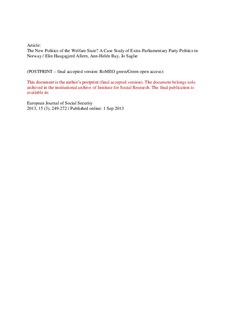| dc.contributor.author | Allern, Elin Haugsgjerd | |
| dc.contributor.author | Bay, Ann-Helén | |
| dc.contributor.author | Saglie, Jo | |
| dc.date.accessioned | 2017-11-02T11:49:55Z | |
| dc.date.available | 2017-11-02T11:49:55Z | |
| dc.date.created | 2013-09-24T13:40:49Z | |
| dc.date.issued | 2013 | |
| dc.identifier.citation | European Journal of Social Security. 2013, 15 (3), 249-272. | |
| dc.identifier.issn | 1388-2627 | |
| dc.identifier.uri | http://hdl.handle.net/11250/2463682 | |
| dc.description.abstract | According to the literature on the ‘new politics of the welfare state’, party politics plays a minor role in welfare policy outputs today. In this article, we ask what the degree of politicisation is below the level of government. Focusing on two specific policy areas –pension reform and anti-poverty policy – and both substantive and procedural aspects of politicisation in the case of Norway, we identify party policies and map intra-party decision-making prior to the 2005 general election. We first conclude that neither policy area seemed to be strongly politicised, but nonetheless, there were limits to the ‘depoliticisation’ of welfare policy even in a consensual state like Norway. Hence, we show – or confirm – that counter-forces might exist between and within political parties in advanced industrial societies, yet to varying degrees across welfare policy fields. | |
| dc.language.iso | eng | |
| dc.title | The New Politics of the Welfare State? A Case Study of Extra-Parliamentary Party Politics in Norway | |
| dc.type | Peer reviewed | |
| dc.type | Journal article | |
| dc.description.version | acceptedVersion | |
| dc.source.pagenumber | 249-272 | |
| dc.source.volume | 15 | |
| dc.source.journal | European Journal of Social Security | |
| dc.source.issue | 3 | |
| dc.identifier.cristin | 1051763 | |
| dc.relation.project | Norges forskningsråd: 210442 | |
| dc.relation.project | Norges forskningsråd: 199836 | |
| cristin.unitcode | 7437,0,0,0 | |
| cristin.unitname | Institutt for samfunnsforskning | |
| cristin.ispublished | true | |
| cristin.fulltext | postprint | |
| cristin.qualitycode | 1 | |
